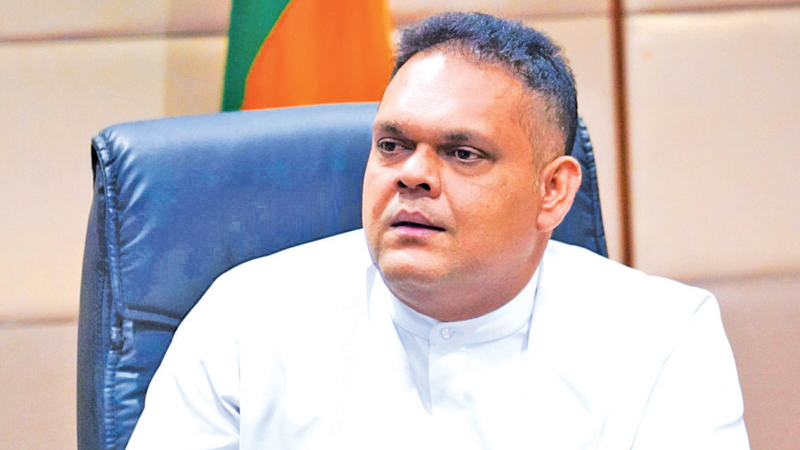 In an interview with the Sunday Observer, former State Minister of Finance, Shehan Semasinghe shared his views on the new Government’s ability to deliver on its promises and the challenges of balancing political decisions with economic stability. Semasinghe also emphasised the need for the current administration to build on the solid foundation laid by the previous Government. He also spoke of the importance of sticking to IMF guidelines and warns against undoing critical reform.
In an interview with the Sunday Observer, former State Minister of Finance, Shehan Semasinghe shared his views on the new Government’s ability to deliver on its promises and the challenges of balancing political decisions with economic stability. Semasinghe also emphasised the need for the current administration to build on the solid foundation laid by the previous Government. He also spoke of the importance of sticking to IMF guidelines and warns against undoing critical reform.
Q: The present leaders, despite having made anti-IMF statements when in the Opposition, now seem to have embraced the IMF. What is your comment on this?
A: It’s good. There is no way out other than sticking to the IMF program. If you try to adjust the program unilaterally and do not fulfill the requirements of the creditors as well as the other requirements, the State will fail and we will have to face the consequences. It is good that the NPP Government is following the IMF guidelines. If they deviate, we will face heavy consequences. I hope President Anura Kumara Dissanayake and the Government will not deviate from what has already been undertaken.
Secondly, all the tough reforms have been completed. That was one of the reasons why people voted against former President Ranil Wickremesinghe for aligning the economic landscape with international standards. Fortunately, the crisis was converted into stabilisation and growth in the economy but people did not accept it because their immediate needs were different. They expected costs, such as energy to be brought down overnight as done in the past by the Government.
I welcome the NPP Government to follow the IMF program and it must be reiterated that any deviation will have severe consequences. We have already completed the difficult reforms, including debt restructuring and handed over a stable economy. It is now up to the President to ensure we don’t return to a crisis.
However, the challenge now is how the Government will fulfill the promises made by the President, given that the IMF program focuses on revenue consolidation. The Government has to achieve 15% revenue in State income by next year and maintain a 2.3% primary surplus. This will ensure that the Government can continue delivering services without financial stress.
Q: Will it be possible to negotiate an amendment to the IMF agreement as the new Government claims?
A: It depends on what the amendments are. I saw the President saying that he would raise the tax-free threshold to Rs 200,000. Most middle-income taxpayers will welcome that decision, but the real test is in delivering it.
We must see how the Government can balance the IMF program and still provide the promised relief which is what the public desires.
While I was in office, we also proposed an income tax reduction and had compensatory measures in place to make up for the revenue loss. With the President’s proposed amendments, the loss from income tax alone is estimated to be about Rs 250 million. I assume the President has alternative revenue measures to fill this gap.
The President has promised a reduction in VAT which currently brings in about Rs 1,400 billion annually. With only three months left in the year, it’s unclear how these amendments will affect revenue and where compensatory measures will come from.
If the Government makes political decisions that contradict the IMF program, the debt restructuring process will be affected and we may have to reverse reforms.
I urge the Government not to risk the country’s economy by undoing the good policies we implemented in consultation with the IMF, World Bank, Paris Club, China, India and other stakeholders. Reversing these policies for political reasons would be a mistake.
Sri Lanka has a history of stabilising its economy, only to revert to harmful old practices. This time, we must avoid repeating those mistakes. Any reversal of sound economic policies will push us back into crisis.
Q: Would you say that the new Government’s economic journey will be much easier due to the solid foundation laid by former President Ranil Wickremesinghe?
A: Absolutely, the foundation is solid. Revenue consolidation has been implemented, expenditure controls are in place and state-owned enterprises that were previously making huge losses have been turned into profit-making ventures.
The most critical achievement is debt restructuring. We have worked to regain debt sustainability with bilateral creditors as well as the all-important ISB holders. Now, we are nearing the bond exchange, pending the appointment of the bond manager. Once that is completed, the process will be done. If we don’t follow through, Sri Lanka will lose access to capital markets again which would be disastrous.
I believe the President realises that things are much more difficult and challenging than they seemed while they were in the Opposition. He now understands the importance of having treasury bonds and bills in place and rolling them over, which is now happening. When in the Opposition, the President criticised these standard, transparent practices but I’m confident he now understands their necessity.
Q: You have also expressed satisfaction that the new Government is sticking to the vehicle import plan you formulated. What is your comment on that?
A: Yes, we implemented these restrictions strategically and in a transparent manner. I spoke in Parliament months ago about why vehicle imports were restricted and how these measures would be lifted over time. The restrictions were necessary due to the severe depletion of foreign reserves. We couldn’t meet even the basic import requirements for essential goods such as food.
Now, foreign reserves have accumulated and it’s the right time to announce these changes. I’m pleased to see President Anura Kumara Dissanayake rightly following the vehicle import plan that was put in place by the previous Government under former President Ranil Wickremesinghe. It’s good to see the continuation of transparent policies which I am personally proud of.
When we took over, Sri Lanka was bankrupt and we successfully led the effort to bring the country out of that crisis. I led the IMF negotiations along with our international partners and ISB holders. Together, we revamped the economy to ensure sustainability and to prevent the country from falling into another crisis.
Q: There is a growing demand for parties to nominate more educated professional youth, including women for the upcoming General Elections. What are your proposals on this?
A: It’s a positive move but it needs to be administered practically. We saw how initiatives such as ‘Viyathmaga’ which led to a catastrophe in the country. I hope we don’t repeat that mistake. It’s good to have new faces but the challenges of governing are much more complex than what is assumed when in the Opposition. I’m sure President Anura Kumara realises this.
I also want to point out the misconception about the fuel pricing formula. During the election campaign, the President and Prime Minister gave the impression that fuel prices could be reduced by Rs 150 if corruption and bribery were eliminated from the sector. In reality, the prices could only be reduced by Rs 20-25. This shows how political promises don’t often align with what can be practically achieved.
The fuel pricing formula was developed with the assistance of the IMF and other authorities in Sri Lanka and it’s a transparent process. Reducing taxation on fuel would impact State revenue and a drop in revenue would make it difficult for the Government to meet essential public needs.
I believe the President and his team will soon realise how their criticism while in Opposition was often misplaced. Instead of focusing on political rhetoric, I urge the Government to appreciate the work done by the previous administration and build on it. The majority of Sri Lankans have placed their faith in this new leadership, so it’s time for them to deliver rather than dwell on past criticism.
Q: Is it possible that the General elections will have a different political dynamic than the Presidential election as the battleground shifts to electorate level?
A: I don’t think so. In my opinion, without a strong Government and a majority in Parliament, the President cannot deliver on what he promised to the people. I believe the people will give him the required number of seats to run the country. If he gets that majority, he will have no excuses. The President has been elected and if Parliament is elected with a clear majority then it’s all about delivery. It is the delivery that will matter most!
Q: Why are you not contesting the elections this time?
A: I believe I have delivered on what was entrusted to me. I was given the responsibility by former President Wickremesinghe to take the country out of bankruptcy, stabilise the economy and move it towards growth. We’ve done that. I’m proud that I handed over a stable economy.
However, I would like to remind everyone that the economy should remain the core focus of the current administration. While we have stabilised and seen recent phases of growth, there is still a long way to go, especially with global crises such as the ongoing war in the Middle East and the conflict between Russia and Ukraine. The President should continue attending international fora and conferences to explain how we will move the country forward. Without international support, we won’t get far.
We succeeded in our challenges without the support of the Opposition, including the President who now endorses the IMF program. They voted against every amendment and motion we brought in, yet today, they must recognise that programs such as the ‘Aswasuma’, which support the poor and vulnerable, are critical. There have been claims that political alliances would decide who benefits from social welfare programs. Since they are in power we will look forward as to how these welfare programs are run.
The Government also needs to prioritise the completion of the third IMF review. We have overperformed in every metric so far, so there should be no concerns. Any delay in the review could cause delays in the release of the fourth tranche, leading to cash flow challenges for the Treasury. We never delayed any reviews or unlocking of tranches during our tenure, and delays now could affect confidence with the IMF, World Bank, UN, ADB and other multilateral lending bodies. I want to emphasise that a regime change does not mean we are out of the crisis. The economy must still be managed well, regardless of who is in power. I wish the President and his team good luck and hope they continue the good work we initiated.




